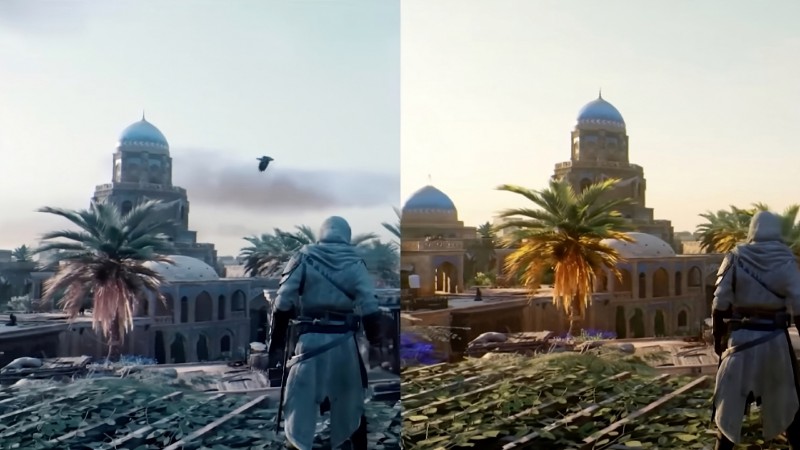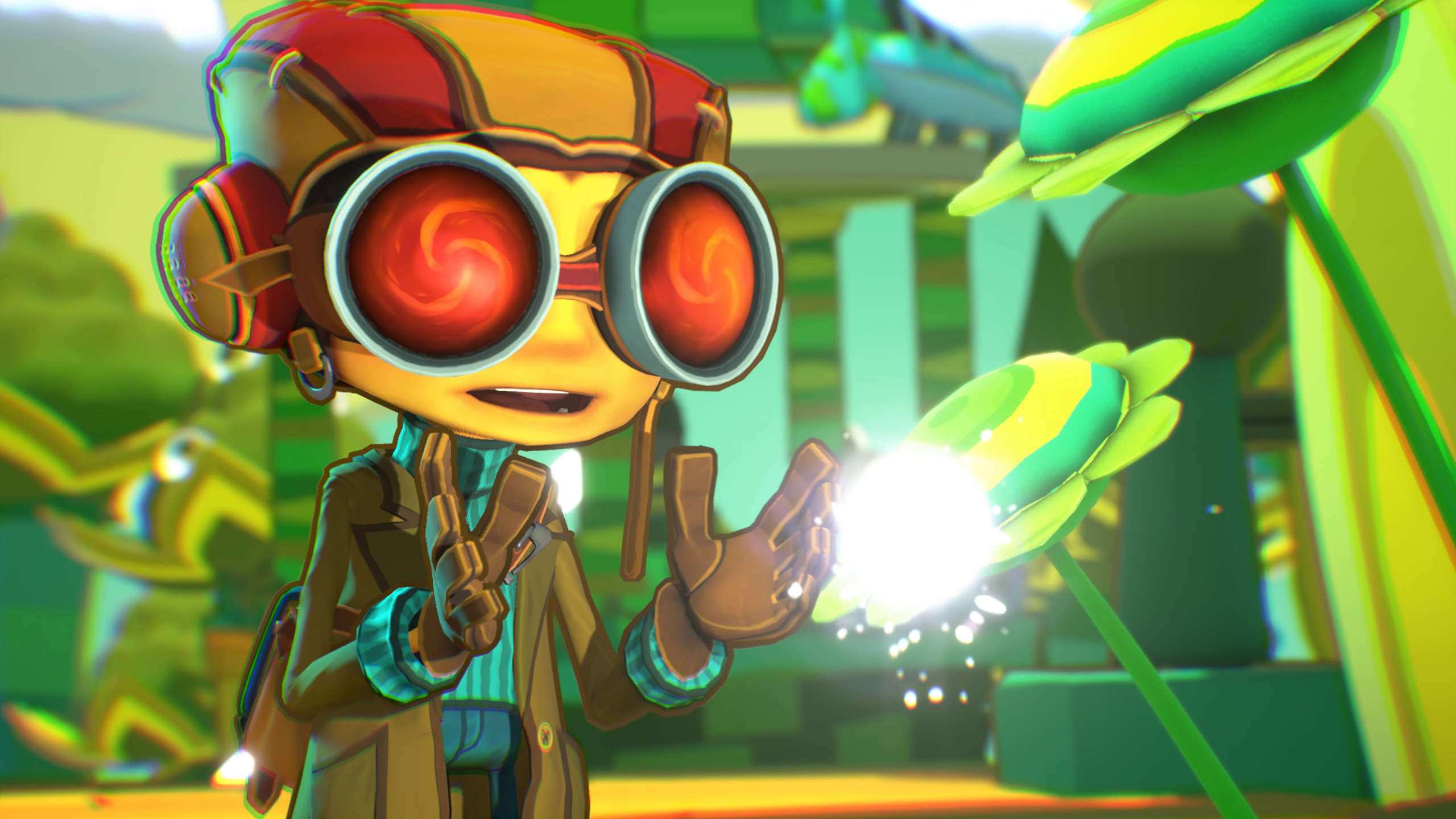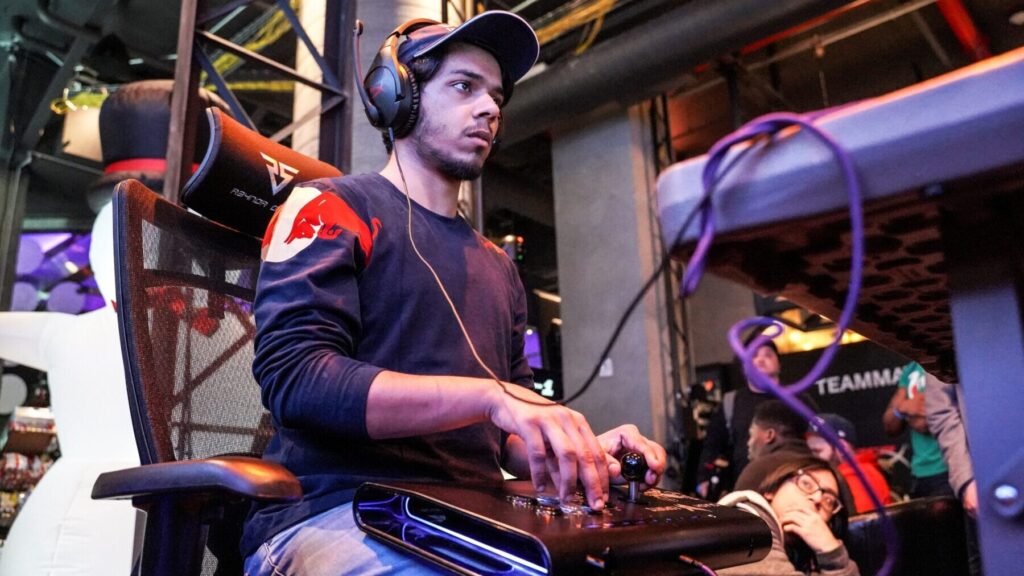
Assassin's Creed Mirage brings players to Baghdad in 861, during its Golden Age when it was the cultural and technological epicenter of the region. The city feels alive with merchants, townsfolk, guards, palaces, and more. It's vibrant, lively, and, well, looks and sounds like a city. It's painted with hues of desert orange and "Arabian Nights" blue skies, something intentional, according to artistic director Jean-Luc Sala. Having lived in the region, Sala says he and his visual team infused many sights he remembers near the Tigris River to bring Baghdad to life. The result is beautiful, if my two hours of hands-on time is any indication. With Mirage meant to serve as an homage to the first Assassin's Creed that started the series in 2007, Sala and the rest of the team at Ubisoft Bordeaux added an option to make Baghdad look more like the Jerusalem Altair explored. In the video above, you can see the "nostalgic visual filter" in action, and if you've played Assassin's Creed, it should look familiar. That's because this filter is essentially an Assassin's Creed filter, meant to bring back the hues of blue from that first 2007 adventure. "We know how excited our community is [and] we also have a nice surprise for our long-timers," Sala says in the video. "We implemented a nostalgic visual filter as an option for those who wish to explore the game with the desaturated blue-gray color palette from the very first Assassin's Creed game." Having seen and played Mirage, it's not a filter I plan on using much during my first playthrough – perhaps only during quests or moments that feel particularly like Altair's adventure – but it's neat that it exists. And it speaks to how Mirage is meant to celebrate the series' 15th anniversary (which took place last year when the game was announced). As a whole, Mirage serves as a light homage or spiritual connector to the game that started it all. Sala says this filter is a wink and a nod to that. "We know players, and I'm one of those players, have a nostalgic feeling to those [blue-gray colors of the first Assassin's Creed]," Sala tells me. "They have a purpose in AC1. But we wanted to show this setting in this lighting and say, 'It's there if you want it.' It's just like playing L.A. Noire in black and white or Ghost of Tsushima with the Kurosawa filter.” He says the official art direction of Mirage is far away from the AC1 filter, though, with more vibrant colors and no filters. He says it's cliche to have Middle Eastern settings with yellow filters and that everybody does that as if it's mandatory. "But we said, 'Let's be true to what it was – the real lighting and the real colors of everything, and that’s why it's so vivid." While I won't be using this filter too much – Sala's team has seemingly done a fantastic job with Mirage's visual direction – I'm excited for players who want to revel in the nostalgia. The filter looks well done, and I'm sure someone will make a fun side-by-side of Mirage with the filter on and Assassin's Creed to demonstrate similarities and differences. Assassin's Creed Mirage hits PlayStation, Xbox, Amazon Luna, and PC on October 5. For more, be sure to check out Game Informer's exclusive Assassin's Creed Mirage coverage hub by clicking the banner below.
Assassin’s Creed Mirage brings players to Baghdad in 861, during its Golden Age when it was the cultural and technological epicenter of the region. The city feels alive with merchants, townsfolk, guards, palaces, and more. It’s vibrant, lively, and, well, looks and sounds like a city. It’s painted with hues of desert orange and “Arabian Nights” blue skies, something intentional, according to artistic director Jean-Luc Sala.
Having lived in the region, Sala says he and his visual team infused many sights he remembers near the Tigris River to bring Baghdad to life. The result is beautiful, if my two hours of hands-on time is any indication. With Mirage meant to serve as an homage to the first Assassin’s Creed that started the series in 2007, Sala and the rest of the team at Ubisoft Bordeaux added an option to make Baghdad look more like the Jerusalem Altair explored.
In the video above, you can see the “nostalgic visual filter” in action, and if you’ve played Assassin’s Creed, it should look familiar. That’s because this filter is essentially an Assassin’s Creed filter, meant to bring back the hues of blue from that first 2007 adventure.
“We know how excited our community is [and] we also have a nice surprise for our long-timers,” Sala says in the video. “We implemented a nostalgic visual filter as an option for those who wish to explore the game with the desaturated blue-gray color palette from the very first Assassin’s Creed game.”
Having seen and played Mirage, it’s not a filter I plan on using much during my first playthrough – perhaps only during quests or moments that feel particularly like Altair’s adventure – but it’s neat that it exists. And it speaks to how Mirage is meant to celebrate the series’ 15th anniversary (which took place last year when the game was announced). As a whole, Mirage serves as a light homage or spiritual connector to the game that started it all. Sala says this filter is a wink and a nod to that.
“We know players, and I’m one of those players, have a nostalgic feeling to those [blue-gray colors of the first Assassin’s Creed],” Sala tells me. “They have a purpose in AC1. But we wanted to show this setting in this lighting and say, ‘It’s there if you want it.’ It’s just like playing L.A. Noire in black and white or Ghost of Tsushima with the Kurosawa filter.”
He says the official art direction of Mirage is far away from the AC1 filter, though, with more vibrant colors and no filters. He says it’s cliche to have Middle Eastern settings with yellow filters and that everybody does that as if it’s mandatory. “But we said, ‘Let’s be true to what it was – the real lighting and the real colors of everything, and that’s why it’s so vivid.”
While I won’t be using this filter too much – Sala’s team has seemingly done a fantastic job with Mirage’s visual direction – I’m excited for players who want to revel in the nostalgia. The filter looks well done, and I’m sure someone will make a fun side-by-side of Mirage with the filter on and Assassin’s Creed to demonstrate similarities and differences.
Assassin’s Creed Mirage hits PlayStation, Xbox, Amazon Luna, and PC on October 5.
For more, be sure to check out Game Informer’s exclusive Assassin’s Creed Mirage coverage hub by clicking the banner below.







